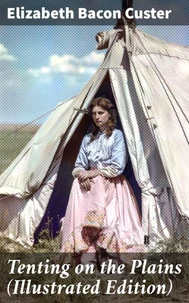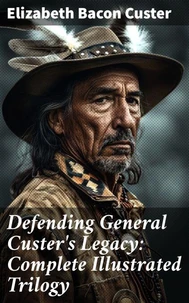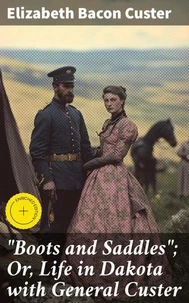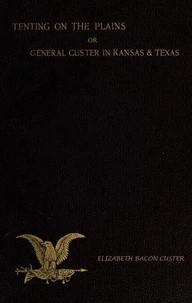Defending General Custer's Legacy: Complete Illustrated Trilogy. Boots and Saddles, Tenting on the Plains, Following the Guidon
Par :Formats :
Disponible dans votre compte client Decitre ou Furet du Nord dès validation de votre commande. Le format ePub est :
- Compatible avec une lecture sur My Vivlio (smartphone, tablette, ordinateur)
- Compatible avec une lecture sur liseuses Vivlio
- Pour les liseuses autres que Vivlio, vous devez utiliser le logiciel Adobe Digital Edition. Non compatible avec la lecture sur les liseuses Kindle, Remarkable et Sony
 , qui est-ce ?
, qui est-ce ?Notre partenaire de plateforme de lecture numérique où vous retrouverez l'ensemble de vos ebooks gratuitement
Pour en savoir plus sur nos ebooks, consultez notre aide en ligne ici
- Nombre de pages814
- FormatePub
- ISBN859-65--4771939-7
- EAN8596547719397
- Date de parution12/11/2023
- Protection num.Digital Watermarking
- Taille7 Mo
- Infos supplémentairesepub
- ÉditeurDIGICAT
Résumé
In "Defending General Custer's Legacy: Complete Illustrated Trilogy, " Elizabeth Bacon Custer offers an intricate exploration of her husband, George Armstrong Custer, weaving a compelling narrative that both defends and romanticizes his controversial legacy. Employing a blend of firsthand accounts, historical analysis, and rich illustrations, Custer's trilogy encompasses key milestones in Custer's life, including his military exploits and the infamous Battle of Little Bighorn.
The literary style is both personal and authoritative, as Custer gracefully balances her passionate defense of her husband with the broader historical context of the American West during the late 19th century, making the work a significant contribution to Civil War and Native American history literature. Elizabeth Bacon Custer, a figure often overshadowed by her husband's notoriety, was herself a writer and a woman of her time who actively engaged in the public discourse surrounding her husband's life and legacy.
Her firsthand experience during pivotal events and her deep understanding of the military and societal values of her era inform her narrative. Custer's unwavering dedication to preserving her husband's name reflects her desire to true history and contend against a pervasive mythos that portrayed Custer in an unfavorable light. This trilogy comes highly recommended for readers interested in military history, women's voices in historical narratives, or the intricate storytelling of personal loyalty amid complex legacies.
Custer's work offers not only a defense of an often-maligned figure but also serves as an engaging window into the tumultuous era of American expansion and conflict, inviting readers to reconsider the multifaceted dimensions of history.
The literary style is both personal and authoritative, as Custer gracefully balances her passionate defense of her husband with the broader historical context of the American West during the late 19th century, making the work a significant contribution to Civil War and Native American history literature. Elizabeth Bacon Custer, a figure often overshadowed by her husband's notoriety, was herself a writer and a woman of her time who actively engaged in the public discourse surrounding her husband's life and legacy.
Her firsthand experience during pivotal events and her deep understanding of the military and societal values of her era inform her narrative. Custer's unwavering dedication to preserving her husband's name reflects her desire to true history and contend against a pervasive mythos that portrayed Custer in an unfavorable light. This trilogy comes highly recommended for readers interested in military history, women's voices in historical narratives, or the intricate storytelling of personal loyalty amid complex legacies.
Custer's work offers not only a defense of an often-maligned figure but also serves as an engaging window into the tumultuous era of American expansion and conflict, inviting readers to reconsider the multifaceted dimensions of history.
In "Defending General Custer's Legacy: Complete Illustrated Trilogy, " Elizabeth Bacon Custer offers an intricate exploration of her husband, George Armstrong Custer, weaving a compelling narrative that both defends and romanticizes his controversial legacy. Employing a blend of firsthand accounts, historical analysis, and rich illustrations, Custer's trilogy encompasses key milestones in Custer's life, including his military exploits and the infamous Battle of Little Bighorn.
The literary style is both personal and authoritative, as Custer gracefully balances her passionate defense of her husband with the broader historical context of the American West during the late 19th century, making the work a significant contribution to Civil War and Native American history literature. Elizabeth Bacon Custer, a figure often overshadowed by her husband's notoriety, was herself a writer and a woman of her time who actively engaged in the public discourse surrounding her husband's life and legacy.
Her firsthand experience during pivotal events and her deep understanding of the military and societal values of her era inform her narrative. Custer's unwavering dedication to preserving her husband's name reflects her desire to true history and contend against a pervasive mythos that portrayed Custer in an unfavorable light. This trilogy comes highly recommended for readers interested in military history, women's voices in historical narratives, or the intricate storytelling of personal loyalty amid complex legacies.
Custer's work offers not only a defense of an often-maligned figure but also serves as an engaging window into the tumultuous era of American expansion and conflict, inviting readers to reconsider the multifaceted dimensions of history.
The literary style is both personal and authoritative, as Custer gracefully balances her passionate defense of her husband with the broader historical context of the American West during the late 19th century, making the work a significant contribution to Civil War and Native American history literature. Elizabeth Bacon Custer, a figure often overshadowed by her husband's notoriety, was herself a writer and a woman of her time who actively engaged in the public discourse surrounding her husband's life and legacy.
Her firsthand experience during pivotal events and her deep understanding of the military and societal values of her era inform her narrative. Custer's unwavering dedication to preserving her husband's name reflects her desire to true history and contend against a pervasive mythos that portrayed Custer in an unfavorable light. This trilogy comes highly recommended for readers interested in military history, women's voices in historical narratives, or the intricate storytelling of personal loyalty amid complex legacies.
Custer's work offers not only a defense of an often-maligned figure but also serves as an engaging window into the tumultuous era of American expansion and conflict, inviting readers to reconsider the multifaceted dimensions of history.






